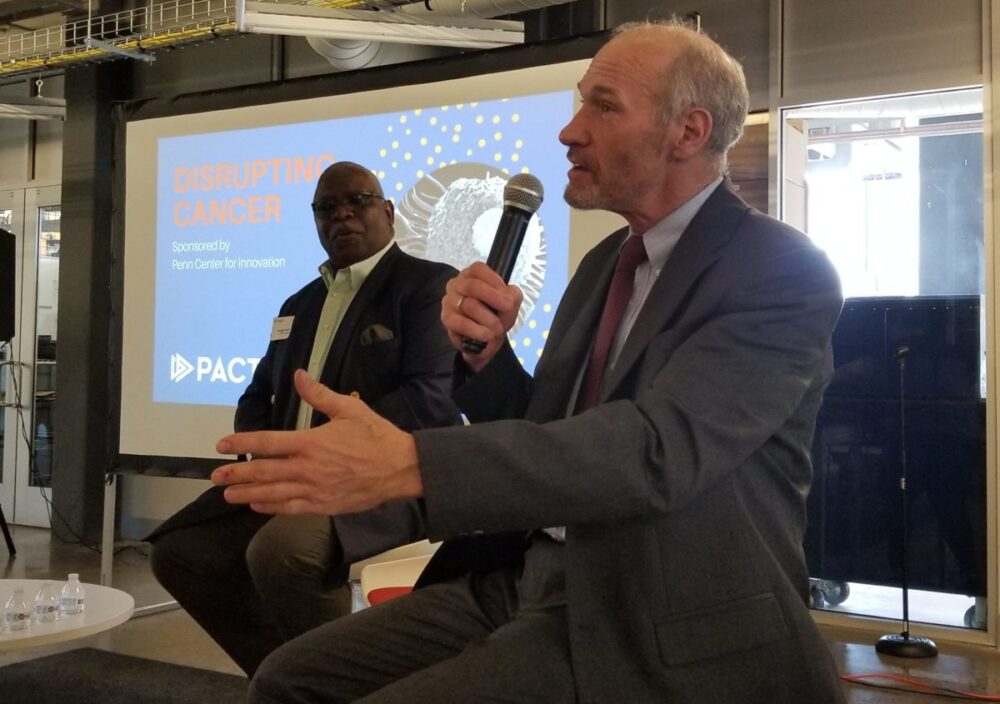Dr. Carl June gets emotional when he remembers that moment — a historic one in science, by most accounts — when the first patient to receive experimental CAR T-cell treatment against advanced blood cancer, developed by his team, came back from the brink of death.
At the PACT and Penn’s Center for Innovation “Disrupting Cancer” event, part of Philly Tech Week 2018 presented by Comcast, the researcher, Navy veteran and director of translational research at the Abramson Cancer Center at Penn, opened up about what’s needed to continue the fight against cancer, in which his FDA-approved Kymriah treatment — developed alongside Novartis and CHOP — is opening new flanks.
A key part of the historic breakthrough happening in Philly, June said at Pennovation on Tuesday, has to do with the oft-lauded Penn ecosystem.
“What Penn has is a giant matrix organization,” said June. “Here, you can put people together together relatively easy and that’s a major advantage. Also, keep in mind that my generation is the first group of kids that didn’t die because of polio, and that’s thanks to the vaccine made here in Pennsylvania. That infrastructure was established here in the Delaware Valley. That didn’t happen in the West Coast, where IT was the big thing.”
In the fight against the 100-plus types of cancer, a group of diseases that are expected to kill over 600,000 Americans in 2018, the unseen enemy is actually one the tech community also grapples with: retaining and recruiting top talent.
“A major effort that I have now is to retain our best trainees,” June said. “Penn is a source of most of the innovation [in this field] so we want to keep the best and recruit the best. That needs to be a major effort so we can grow.”
Dr. June on when he knew for the first time that his innovative therapy for cancer would work @PennMedicine pic.twitter.com/ATjysnqCcd
— Penn Innovation (@PennPCI) May 1, 2018
June recounted that time a partner with interest in prostate cancer was not interested in working with his efforts since treatment for solid cancers (the kind that form in tissues and organs) were too far down the road. But after the first noteworthy paper was published in 2010, the next day June received a call that said “Let’s get to work on prostate cancer.”
“We’ve since started working on that and there’s been a team,” June said. “What we need to do is create a team for for every type of cancer.”
But of course, dollars are also key to drive transformative research forward. After all, it was a sizable donation from the Abramson Family Foundation in 1999 that drew the doctor, a West Coast native, to the Philly area. What kept him here was perseverance, June said.
“Everyone thought it couldn’t be done,” June said of the early days. “Initially no one thought we could do it so we couldn’t get funding. Then it was clear it can be done and they said it couldn’t be a commercial product. Fortunately now we have ways of having a tech transfer handoff and we didn’t have that before. Our challenge is to stay focused.”
Join the conversation!
Find news, events, jobs and people who share your interests on Technical.ly's open community Slack

Philly daily roundup: Student-made college cost app; Central High is robotics world champ; Internet subsidy expiration looms

Philly daily roundup: Earth Day glossary; Gen AI's energy cost; Biotech incubator in Horsham

Philly daily roundup: Women's health startup wins pitch; $204M for internet access; 'GamingWalls' for sports venues

